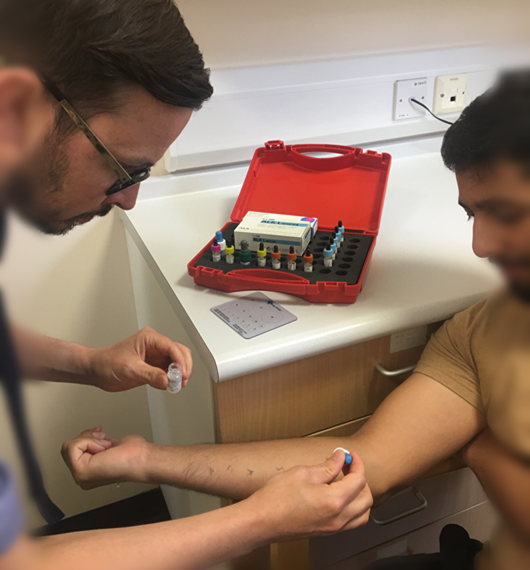
Why am I having a skin prick allergy test?
Your doctor wants to determine if airborne allergens are affecting your airways.
What is a skin prick allergy test?
A Skin Prick Allergy test is carried out to assess whether you are allergic to any airborne allergens. These allergens include, house dust mites, grass, trees and weed pollen, moulds and cat and dog hair.
What does skin prick allergy test involve?
Prior to the test you will be asked by your physiologist whether you have taken any anti-allergy medication such as antihistamines in the previous seven days. You will also be asked whether you have any pets or known allergies. You will be seated for the duration of the test and the physiologist will require either one or both forearms to be bare below the elbow.
The physiologist will first write on your forearm(s) the first letter of each allergen (there are normally 11) before placing a small drop of each allergen onto your skin next to the corresponding letter. The skin will then be given a prick with a small lancet through each drop of liquid. This allows the allergens into the skin. The prick is shallow, only going down to the third layer skin. This layer is similar to the lining of the airways.
You will then be required to wait 15 minutes. During this time any responses you have will appear as a raised bump with a red area on the skin and may feel itchy. One of the allergens used is a positive control which causes a reaction in every patient. This is normal and is used to make sure the test is working correctly. After 15 minutes your physiologist will measure the size of any reactions and relieve any itching with hydrocortisone cream.
Preparation
- Please avoid taking anti-allergy medication such as antihistamines for 72 hours prior to test.
- Please do not apply to the forearms as the oils can interfere with the test.
- The test can last approximately 30 minutes.
If you cannot attend your appointment
If you need to rearrange your appointment, or no longer need an appointment, please call us on 01223 217065 at the earliest opportunity . The ability to reallocate appointments helps us to reduce waiting times.
What if I am unwell prior to the appointment?
If you are unwell please inform the department at the earliest opportunity. However, if you are unwell on the day of the appointment please still call and let us know as this will allow us to rearrange your appointment for a more suitable time.
Who will be present at my appointment?
CUH NHS Trust is a teaching hospital so there may be occasions when a student or other staff members accompany your physiologist. However, we will always seek your permission first.
Test results
After your appointment your test results will be sent to your referring consultant, who will then contact you to discuss the results and the next steps in your treatment.
Consent
You will be asked for consent to perform tests during your appointment. You will also have an opportunity to ask questions before you give consent. In the unlikely event there are risks related to the test, these will be discussed with you before the test starts.
Risks
The most common side effect of skin testing is slightly swollen, red, itchy bumps (wheals). These wheals may be most noticeable during the test. In some people, though, an area of swelling, redness and itching may develop a few hours after the test and persist for as long as a couple of days.
The prick will not normally draw any blood, but in some situations bleeding may occur if the capillaries (tiny blood vessels) are particularly close to the surface, or if you have particularly thin skin and/or are prone to bruising. Please notify your physiologist if you are currently taking any blood thinners such as Warfarin or Aspirin.
Rarely, skin allergy tests can produce a severe, immediate allergic reaction. This is very rare. However for this reason, your test will be performed in an environment where appropriate emergency equipment and medications are available.
Contacts/further information
If you are unsure about any of the information provided in this leaflet or have any other questions then please do not hesitate to contact the lung function department at Addenbrooke’s Hospital on 01223 217065 or alternatively by contacting clinic 2A on 01223 216645. Our opening hours are Monday-Friday from 08:30 to 16:30.
We are smoke-free
Smoking is not allowed anywhere on the hospital campus. For advice and support in quitting, contact your GP or the free NHS stop smoking helpline on 0800 169 0 169.
Other formats
Help accessing this information in other formats is available. To find out more about the services we provide, please visit our patient information help page (see link below) or telephone 01223 256998. www.cuh.nhs.uk/contact-us/accessible-information/
Contact us
Cambridge University Hospitals
NHS Foundation Trust
Hills Road, Cambridge
CB2 0QQ
Telephone +44 (0)1223 245151
https://www.cuh.nhs.uk/contact-us/contact-enquiries/

